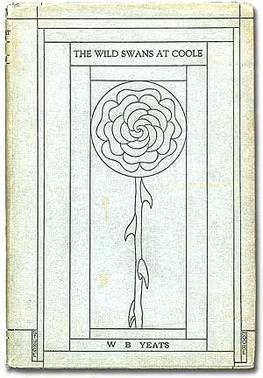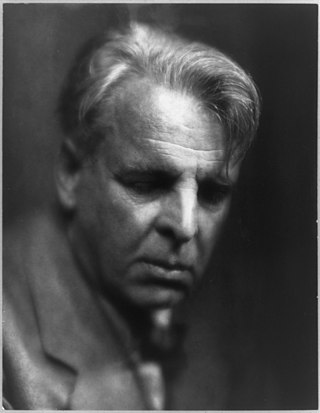Related Research Articles

William Butler Yeats was an Irish poet, dramatist and writer, and one of the foremost figures of 20th-century literature. He was a driving force behind the Irish Literary Revival, and along with Lady Gregory founded the Abbey Theatre, serving as its chief during its early years. He was awarded the 1923 Nobel Prize in Literature, and later served two terms as a Senator of the Irish Free State.

John MacBride was an Irish republican and military leader. He was executed by the British government for his participation in the 1916 Easter Rising in Dublin.
The Wanderings of Oisin is an epic poem published by William Butler Yeats in 1889 in the book The Wanderings of Oisin and Other Poems. It was his first publication outside magazines, and immediately won him a reputation as a significant poet. This narrative poem takes the form of a dialogue between the aged Irish hero Oisín and St. Patrick, the man traditionally responsible for converting Ireland to Christianity. Most of the poem is spoken by Oisin, relating his 300-year sojourn in the isles of Faerie. The poem was not popular among modernist critics like T. S. Eliot. However, Harold Bloom defended this poem in his book-length study of Yeats, and concludes that it deserves reconsideration.
“The Second Coming” is a poem written by Irish poet William Butler Yeats in 1919, first printed in The Dial in November 1920 and included in his 1921 collection of verses “Michael Robartes and the Dancer”. The poem uses Christian imagery regarding the Apocalypse and Second Coming to describe allegorically the atmosphere of post-war Europe. It is considered a major work of modernist poetry and has been reprinted in several collections, including The Norton Anthology of Modern Poetry.

George William Russell, who wrote with the pseudonym Æ, was an Irish writer, editor, critic, poet, painter and Irish nationalist. He was also a writer on mysticism, and a central figure in the group of devotees of theosophy which met in Dublin for many years.

Brian Merriman or in Irish Brian Mac Giolla Meidhre was an 18th-century Irish language bard, farmer, hedge school teacher, and Irish traditional musician from rural County Clare.
The Tower is a book of poems by W. B. Yeats, published in 1928. The Tower was Yeats's first major collection as Nobel Laureate after receiving the Nobel Prize in 1923. It is considered to be one of the poet's most influential volumes and was well received by the public.

"The Stolen Child" is an 1889 poem by William Butler Yeats, published in The Wanderings of Oisin and Other Poems.

The Wild Swans at Coole is the name of two collections of poetry by W. B. Yeats, published in 1917 and 1919.

"Politics" is a poem by Irish poet William Butler Yeats written on May 24, 1938. It was composed during the time of the Spanish Civil War as well as during the pre-war period of Adolf Hitler's Third Reich in Germany. The poem hints at the political situations of "Rome" (Italy), "Russia", and Spain, but ultimately discusses topics more relevant to private human interaction rather than public, or political situations. The poem never mentions Germany or Hitler, despite the fact that the "war and war's alarms" surrounding the poem's creation arose from fears of Germany's aggression rather than Italy's, Russia's, or Spain's. Many versions of the text exist: the original typescript of May 1938, the first typescript with hand-written corrections dated August 12, 1938, as well as a final "Coole Edition" of the poem dated June 29, 1939, which was not published until it was included in Last Poems in 1939. Yeats intended for the poem to be printed last in the collection, as an envoi to "The Circus Animals' Desertion", and while a debate as to the true order of the poems has continued since 1939, "Politics" was the last lyric poem Yeats wrote and remains the final work printed in all posthumous editions.
"An Irish Airman Foresees His Death" is a poem by Irish poet William Butler Yeats (1865–1939), written in 1918 and first published in the Macmillan edition of The Wild Swans at Coole in 1919. The poem is a soliloquy given by an aviator in the First World War in which the narrator describes the circumstances surrounding his imminent death. The poem is a work that discusses the role of Irish soldiers fighting for the United Kingdom during a time when they were trying to establish independence for Ireland. Wishing to show restraint from publishing political poems during the height of the war, Yeats withheld publication of the poem until after the conflict had ended.
"Down by the Salley Gardens" is a poem by William Butler Yeats published in The Wanderings of Oisin and Other Poems in 1889.
Ego Dominus Tuus, Latin for "I am your lord", sometimes translated as "I am your master", is a poem by the Irish poet William Butler Yeats. It was published in the 1918 book Per Amica Silentia Lunae, where it introduced some of Yeats's essays, and collected with other poems in The Wild Swans at Coole (1919). The title is taken from Dante's La Vita Nuova: the words "ego dominus tuus" are spoken to Dante in a dream by the personification of Love. The two characters of the poem, Hic and Ille, are Latin words meaning this man and that man, respectively. Ezra Pound identified Ille with 'Willie', or Yeats: the poem covers many characteristic themes of Yeats, in particular the image of the mask and the concept of the double or "anti-self". The dialogue of Hic and Ille treats the poetry of Dante, John Keats, and Yeats himself, contrasting the words of each poet with the experience of their lives.

"The Wild Swans at Coole" is a lyric poem by the Irish poet William Butler Yeats (1865–1939). Written between 1916 and early 1917, the poem was first published in the June 1917 issue of the Little Review, and became the title poem in the Yeats's 1917 and 1919 collections The Wild Swans at Coole.

"On being asked for a War Poem" is a poem by William Butler Yeats written on 6 February 1915 in response to a request by Henry James that Yeats compose a political poem about World War I. Yeats changed the poem's title from "To a friend who has asked me to sign his manifesto to the neutral nations" to "A Reason for Keeping Silent" before sending it in a letter to James, which Yeats wrote at Coole Park on 20 August 1915. The poem was prefaced with a note stating: "It is the only thing I have written of the war or will write, so I hope it may not seem unfitting." The poem was first published in Edith Wharton's The Book of the Homeless in 1916 as "A Reason for Keeping Silent". When it was later reprinted in The Wild Swans at Coole, the title was changed to "On being asked for a War Poem".
"The Lake Isle of Innisfree" is a twelve-line poem comprising three quatrains, written by William Butler Yeats in 1888 and first published in the National Observer in 1890. It was reprinted in The Countess Kathleen and Various Legends and Lyrics in 1892 and as an illustrated Cuala Press Broadside in 1932.
Purgatory is a drama by the Irish writer William Butler Yeats. It was first presented in at the Abbey Theatre, Dublin, on 19 August 1938, a few months before Yeats' death.
"The Sea-Bell" or "Frodos Dreme" is a poem with elaborate rhyme scheme and metre by J.R.R. Tolkien in his 1962 collection of verse The Adventures of Tom Bombadil. It was a revision of a 1934 poem called "Looney". The first-person narrative speaks of finding a white shell "like a sea-bell", and of being carried away to a strange and beautiful land.

Blood and the Moon is a poem by Irish poet William Butler Yeats written in 1927. It was first published in the Spring 1928 issue of The Exile and then in the collection The Winding Stair in 1929, before being reprinted in The Winding Stair and Other Poems in 1933. Yeats composed the poem in response to the 1927 assassination of Kevin O'Higgins, the Vice-President of the Free State, whom Yeats had known personally. The poem contains many themes common in Yeats's poems from the 1920s including the "tower", a reference to Thoor Ballylee, which had been the title of a collection of works printed the year before "Blood and the Moon" was published, as well as the "gyre" which had been a major focus of his 1920 poem "The Second Coming".
"To the Rose upon the Rood of Time" is poem by W. B. Yeats that was published in The Rose in 1893. The poem is one of many early Yeatsian lyrical poems which use the symbol of the rose. The poem consists of twelve rhyming couplets in iambic pentameter.